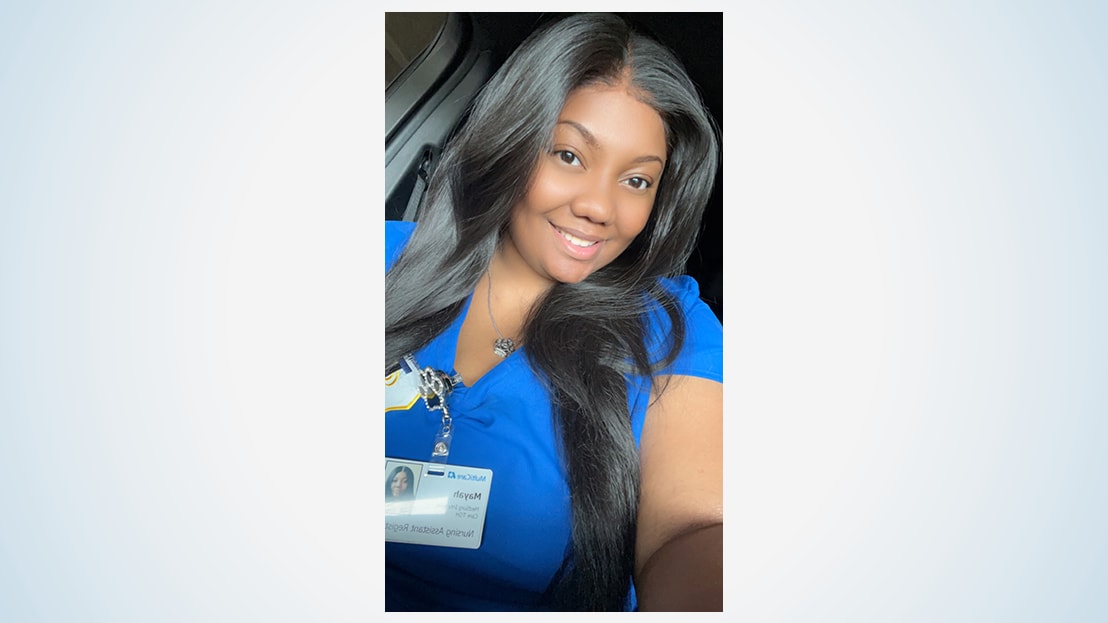MultiCare training program helps military spouse enter health care field

When Mayah Owens enters the room, her warmth and optimism are obvious. She loves being around people, and her energy is infectious.
She credits a MultiCare Certified Nursing Assistant (CNA) training program with helping her begin a career in health care.
A family legacy
Owens was interested in health care from a young age. Her grandmother is a patient care technician (PCT), so Owens grew up hearing stories about the value of excellent patient care.
“I got to hear about how she would advocate for her patients,” Owens says.
Patients would often tell her (the PCT) or the registered nurse (RN) about pain or complaints rather than telling the physician directly.
“It can sometimes be hard for people to communicate those things with doctors,” she says. “Often it would be the PCT or the RN’s job to relay information to the physician. When the PCT or RN speak to the physician about the issue, then the patient gets what they need.”
Owens saw how much patients valued having a hospital staff member advocate for them. Though uncertain which role was the best fit for her, she knew one thing for sure.
“I wanted a role where I could spend as much time with patients as possible, providing bedside care,” Owens says.
But it took Owens a while to find an entry point into the field. She’s a military spouse, and moving frequently can make education and employment in your chosen field a challenge.
That changed when she and her husband moved to Washington state in April 2023.
A foot in the door
When they arrived in Washington, Owens began applying for jobs and educational opportunities in health care — including with MultiCare.
She got a call for an interview with the MultiCare CNA Training Program and started in May 2023.
“I felt like I was learning it all at once, but it was doable. And we were getting paid for our time.”
When offered a list of units across the system that needed CNAs, Owens chose MultiCare Tacoma General Hospital’s intensive care unit (ICU). The program alternates between classes at Tacoma Community College and clinical hours at Tacoma General.
“I felt like I was learning it all at once, but it was doable. And we were getting paid for our time,” Owens says.
Participants complete their clinical hours in their chosen units after finishing the program. This approach builds relationships and familiarity with work schedules, creating a smooth transition to work after earning the certification.
Finding purposeful work and personal connection
After passing her written and clinical exams, Owens is now a full-fledged CNA.
It’s obvious how much she cares for her patients and co-workers. She even prefers working night shifts because of the purpose and connections she finds there.
“I’m able to spend a lot of time with patients, especially when they’re up in the night,” Owens shares.
She recalls special moments between 2-4am when she can be present with patients through their physical or emotional challenges — like the time she helped a patient with a terminal diagnosis choose songs for their own memorial service.
Owens has a high value for this type of holistic care at the bedside.
“I genuinely love what I do. I tend to have less on my plate than the RNs, which allows me to be close to the patients for longer stretches of time, especially at night,” she says.
Owens goes out of her way to communicate to the RNs that she is there to help them. She speaks highly of their commitment to patient care and willingness to allow Owens to make the most of her clinical abilities.
“My job is to be useful to the nurses and make their jobs easier,” she says. “I try to remind them to take breaks and let me do vitals or turn patients. The staff nurses are phenomenal.”
For example, Owens fondly recalls bonding with an RN and patient over the hefty results of administering a suppository ahead of the patient’s colonoscopy. The three women laughed together while spending more than an hour caring for the patient’s needs.
“Your shift as a CNA is going to come down to the nurses that you have,” she says. “As a unit, we are a team. We rely on each other, even for nurses we aren’t assigned to that night. When we ask for help, they are eager to help.”
An irrepressibly optimistic spirit, Owens is also honest about the challenges of a CNA’s role.
“This is a demanding job, but I want to have a positive mindset because it changes how you approach work,” she says. “I never want to miss work, even when I’m sick and know I need to stay home. My managers are really supportive.
“This is something I’ve wanted to do for a long time,” Owens continues. “Now that I can do it, I love what I do. Even on heavy nights, I just focus on preparing and planning for the next shift.”
Owens is grateful for her career in health care.
“God has amazing ways of maneuvering our lives. We were originally supposed to go to Virginia, but the Army wound up sending [my husband and me] to Washington state,” she reflects. “I’m not sure what would have happened if we hadn’t been sent here.”
What's next
- Explore other MultiCare training programs
- Have questions? Email [email protected]



